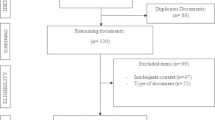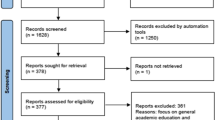Abstract
The use of mobile learning in education is growing at an exponential rate. To best understand how mobile learning is being used, it is crucial to gain a collective understanding of the research that has taken place. This systematic review reveals the trends in mobile learning in science with a comprehensive analysis and synthesis of studies from the year 2000 onward. Major findings include that most of the studies focused on designing systems for mobile learning, followed by a combination of evaluating the effects of mobile learning and investigating the affective domain during mobile learning. The majority of the studies were conducted in the area of life sciences in informal, elementary (5–11 years) settings. Mobile devices were used in this strand of science easily within informal environments with real-world connections. A variety of research methods were employed, providing a rich research perspective. As the use of mobile learning continues to grow, further research regarding the use of mobile technologies in all areas and levels of science learning will help science educators to expand their ability to embrace these technologies.







Similar content being viewed by others
References
Ally M, Prieto-Blázquez J (2014) What is the future of mobile learning in education? Mob Learn Appl High Educ (Spec Sect) 11(1):142–151
Avaamidou L (2008) Prospects for the use of mobile technologies in science education. AACE J 16(3):347–365
Britten N, Campbell R, Pope C, Donovan J, Morgan M, Pill R (2002) Using meta ethnography to synthesis qualitative research: a worked example. J Health Serv Res Policy 7(4):209–215
Chen Y-S, Kwo T-C, Sheu J-P (2005) Realizing outdoor independent learning with a butterfly-watching mobile learning system. J Educ Comput Res 33(4):395–417
Chen C-H, Hwang G-J, Tsai C-H (2014) A progressive prompting approach to conducting context-aware learning activities for natural science courses. Interact Comput 26(4):348–359
Chu H-C, Hwang G-J, Tsai C-C (2010) A knowledge engineering approach to developing mindtools for context-aware ubiquitous learning. Comput Educ 54(1):289–297
Crompton H (2013a) A historical overview of mobile learning: toward learner-centered education. In: Berge ZL, Muilenburg LY (eds) Handbook of mobile learning. Routledge, Florence, pp 3–14
Crompton H (2013b) Mobile learning: new approach, new theory. In: Berge ZL, Muilenburg LY (eds) Handbook of mobile learning. Routledge, Florence, pp 47–57
Crompton H, Traxler J (in press) Mobile learning in development contexts: policy and research. United Nations Educational, Scientific, and Cultural Organization (UNESCO), Paris
Dekhane S, Tsoi MY (2012) Designing a mobile application for conceptual understanding: integrating learning theory with organic chemistry learning needs. Int J Mob Blended Learn 4(3):34–52
Frohberg D, Göth C, Schwabe G (2009) Mobile learning projects—a critical analysis of the state of the art. J Comput Assist Learn 25(4):307–331
Hemingway P, Brereton N (2009) In: Hayward Medical Group (ed) What is a systematic review? [Article]. http://www.medicine.ox.ac.uk/bandolier/painres/download/whatis/syst-review.pdf. Retrieved 24 Oct 2014
Hsiao H-S, Lin C-C, Feng R-T, Li KJ (2010) Location based services for outdoor ecological learning system: design and implementation. J Educ Technol Soc 13(4):98–111
Hsieh S-W, Jang Y-R, Hwang G-J, Chen N-S (2011) Effects of teaching and learning styles on students’ reflection levels for ubiquitous learning. Comput Educ 57(1):1194–1201
Hung JL, Zhang K (2012) Examining mobile learning trends 2003–2008: a categorical meta-trend analysis using text mining techniques. J Comput High Educ 24(1):1–17
Hung Pi-Hsia, Hwang Gwo-Jen, Su I-H, Lin I-H (2012) A concept-map integrated dynamic assessment system for improving ecology observation competences in mobile learning. Turk Online J Educ Technol 11(1):10–19
Hwang GJ, Tsai CC (2011) Research trends in mobile and ubiquitous learning: a review of publication in selected journals from 2001 to 2010. Br J Educ Technol 42(4):E65–E70
Hwang G-J, Chu H-C, Shih J-L, Huang S-H, Tsai C-C (2010) A decision-tree-oriented guidance mechanism for conducting nature science observation activities in a context-aware ubiquitous learning environment. Educ Technol Soc 13(2):53–64
Johnson L, Adams Becker S, Estrada V, Freeman A (2014) NMC Horizon Report: 2014:k-12 Edition. The New Media Consortium, Austin
King A (2008) In vivo coding. In: Given LM (ed) The SAGE encyclopedia of qualitative research methods. SAGE, London, pp 473–474
Kismihók G (2007) The role of mobile learning in European education: mobile learning country report Taiwan. In: Dias A, Keegan D, Kismihokp G, Mileva N, Rekkedal T (eds) Achievements of mobile learning today. Exact, Dublin, Ireland, pp 143–163
Liberati A, Altman DG, Tetzlaff J, Mulrow C, Gøtzsche PC et al (2009) The PRISMA statement for reporting systematic reviews and meta-analyses of studies that evaluate health care interventions: explanation and elaboration. Ann Intern Med 151(4):65–94
Liu M, Scordiono R, Geurtz R, Navarrete C, Ko Y, Lim M (2014) A look at research on mobile learning in K-12 education from 2007 to the present. J Res Technol Educ 46(4):325–372
Metz S (2014) Science teaching and learning in the 21st century. Sci Teach 81(6):3–4
National Research Council (2009) Learning science in informal environments: people, places, and pursuits. The National Academies Press, Washington
Next Generation Science Standards (2013) How to read the Next Generation Science Standards (NGSS). http://www.nextgenscience.org/sites/ngss/files/How%20to%20Read%20NGSS%20-%20Final%2008.19.13.pdf
Oakley A (2012) Foreword. In: Gough D, Oliver S, Thomas J (eds) An introduction to systematic reviews. SAGE, London, pp vii–x
Peng H, Chuang P-Y, Hwang G-J, Chu H-C, Wu T-T, Huang S-X (2009) Ubiquitous Performance-Support System as mindtool: a case study of instructional decision making and learning assistant. J Educ Technol Soc 12(1):107–120
Sandelowski M, Voils CJ, Leeman J, Crandlee JL (2011) Mapping the mixed methods—mixed research synthesis terrain. J Mixed Methods Res 6(4):317–331
Sharples M, Taylor J, Vavoula G (2007) A theory of learning for the mobile age. In: Andrews R, Haythornthwaite C (eds) The Sage handbook of elearning research. Sage, London, pp 221–247
Song Y (2014) “Bring Your Own Device (BYOD)” for seamless science inquiry in a primary school. Comput Educ 74:50–60
Song Y, Wong L-H, Looi C-K (2012) Fostering personalized learning in science inquiry supported by mobile technologies. Educ Technol Res Dev 60(4):679–701
Traxler J (2009) Learning in a mobile age. Int J Mob Blended Learn 1(1):1–12
Tucker-Raymond E, Varelas M, Pappas CC (2013) Children’s conceptions of being scientists. In: Varelas M, Pappas CC (eds) Children’s ways with science and literacy: integrated multimodal enactments in urban elementary classrooms. Routledge, New York, pp 186–209
Vogel JJ, Vogel DS, Canon-Bowers CA, Muse K, Wright M (2006) Computer gaming and interactive simulation for learning: a meta-analysis. Educ Comput Res 34(3):243–299
Wingkvist A, Ericcson M (2011) A survey of research methods and purposes in mobile learning. Int J Mob Blended Learn 3(1):1–17
Wu WH, Wu YC, Chen CY, Kao HY, Lin CH, Huang SH (2012) Review of trends from mobile learning studies: a meta-analysis. Comput Educ 59(2):817–827
Author information
Authors and Affiliations
Corresponding author
Rights and permissions
About this article
Cite this article
Crompton, H., Burke, D., Gregory, K.H. et al. The Use of Mobile Learning in Science: A Systematic Review. J Sci Educ Technol 25, 149–160 (2016). https://doi.org/10.1007/s10956-015-9597-x
Published:
Issue Date:
DOI: https://doi.org/10.1007/s10956-015-9597-x




